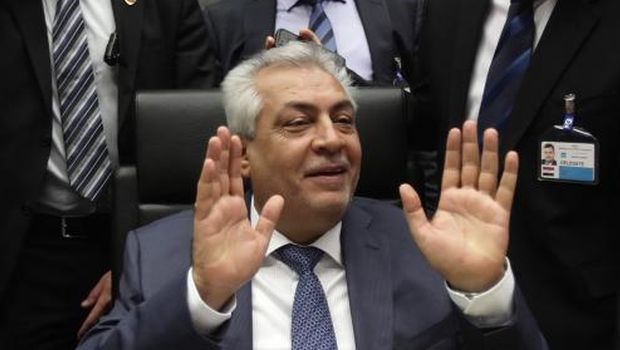
Iraq’s Oil Minister Abdul Kareem Al-Luaibi, seated, talks to journalists before a meeting of OPEC oil ministers in Vienna on June 11, 2014. (Reuters/Heinz-Peter Bader)
Dammam, Asharq Al-Awsat—The current crisis in Iraq has had no direct impact on the country’s oil exports, despite a battle for control of the country’s largest oil refinery, and the city of Kirkuk—home to one of the country’s major oil fields—falling under Kurdish control, energy sector experts told Asharq Al-Awsat.
“Iraqi oil exports have not stopped . . . and it is very unlikely that they will, because most Iraqi oil production comes from fields in the country’s south, which are [currently] far from the unrest and the fighting,” said Saudi oil expert Sidad Al-Husseini.
This echoes recent comments from Iraqi Oil Minister Abdul Kareem Al-Luaibi, who said last Wednesday ahead of an OPEC meeting in Vienna that oil from the country’s south remained “very, very safe,” according to the Wall Street Journal.
Production in Iraq’s south has been steadily rising in previous months. Total national production reached 3.5 million barrels per day (bpd) in February, leading to record export figures of 2.8 million bpd on average in the same month—2.5 million of which came from Basra in the country’s south.
On Thursday Luaibi told Reuters that Iraq’s oil production remained steady at 2.6–2.7 million bpd.
The current crisis in Iraq erupted last week when extremist militant group, the Islamic State of Iraq and Syria (ISIS), took control of Mosul, the biggest city in northern Iraq, and Saddam Hussein’s hometown of Tikrit, plunging the country into chaos and sending shockwaves around the world.
Mosul is close to Iraq’s Bayji oil refinery, and a battle is currently raging for control of the installation between Iraqi security forces—aided by armed Shi’a groups and conscripts—and insurgents, reportedly including members of ISIS.
Mosul is lies in area which is thought to hold some of the world’s largest oil reserves, with an estimated total of 24 billion barrels. This includes the Kirkuk oilfield, which produces some 400,000 bpd, while the city is a major hub for Iraqi energy exports.
Kirkuk and the oilfield are now under the control of Iraq’s Kurds. Nonetheless, Husseiny said he expects oil production to remain normal at the Kirkuk field. “It is in their [the Kurds’] interests for oil production to remain steady,” he said.
Iraq’s federal government and the autonomous Kurdistan region have been locked in a bitter oil dispute in recent months, with Baghdad maintaining that the autonomous Kurdish Regional Government (KRG) in Erbil must export oil only through Iraq’s state-owned oil company SOMO.
Defying Baghdad, the KRG has struck a number of deals with major international oil firms, as well as exporting the region’s oil via Turkey.
Two tankers have been loaded with Kurdish oil in recent weeks at the Turkish port of Ceyhan. A third is scheduled to depart the port on June 22, Turkey’s Oil Minister Taner Yıldız said on Monday.
Following the capture of Mosul by ISIS, oil prices roses rose to a 10-month high, with Brent crude gaining more than 4 percent, though rallying slightly by the end of the week. On Monday Brent crude rose to 113 US dollars per barrel.
However, Husseini maintained that global oil prices had still not reached “crisis levels” of 125 dollars per barrel which he said could then have an impact on global markets.
But fears continue among observers over OPEC’s second-biggest exporter’s ability to rebuild its oil infrastructure and maintain its current level of exports, especially in light of a global shortfall caused by decreased exports from fellow OPEC members Libya and Iran.
But Kuwaiti oil expert Kamel Al-Hermi said it would be inaccurate to blame the recent rise in oil prices solely on Iraq, since “global oil markets look not just to Iraq but to the wider oil-producing regions, such as Libya.”
In Libya, production has fallen to a tenth of its usual capacity because of industrial action at oil fields and export terminals, and with the government fighting for control of some major ports with insurgents.
“If Iraq follows Libya . . . it will cause a crisis in the [global oil] market,” said Hermi.
“There are ways to stem the rise in prices if there is a shortage in global oil output . . . in case the worst happens and the fighting spreads to the [Iraqi] south,” he said, adding that the US should ease restrictions on oil-producer Iran, whose oil export activity has for years been hindered by crippling sanctions as a result of its controversial nuclear program.
But Husseini sees Saudi Arabia as the world’s major lifeline should the worst occur in Iraq, and its estimated 2.5-million-bpd of oil are halted. “Iran’s [oil-producing] capabilities are limited because its fields are not in good shape as a result of the sanctions, so it can’t bump up its exports to 2 million bpd [to cover the shortfall],” he said.
He continued: “Iraq’s contribution [to global production] could be covered by Saudi Arabia, for whom an increase of 2 million bpd in production would be easy, with the other 500,000 covered by the other OPEC countries.”
Prior to ISIS’s stunning advance across northern Iraq, oil ministers said last Tuesday ahead of the OPEC meeting in Vienna that they would look to Saudi Arabia to cover the global shortfall caused by the Libyan crisis.
In May Saudi Oil Minister Ali Al-Naimi told reporters in the South Korean capital Seoul that the Kingdom would be capable of boosting production to as much as 12.5 million bpd—which would constitute record levels according to OPEC data—in case of a major global slowdown in production.
